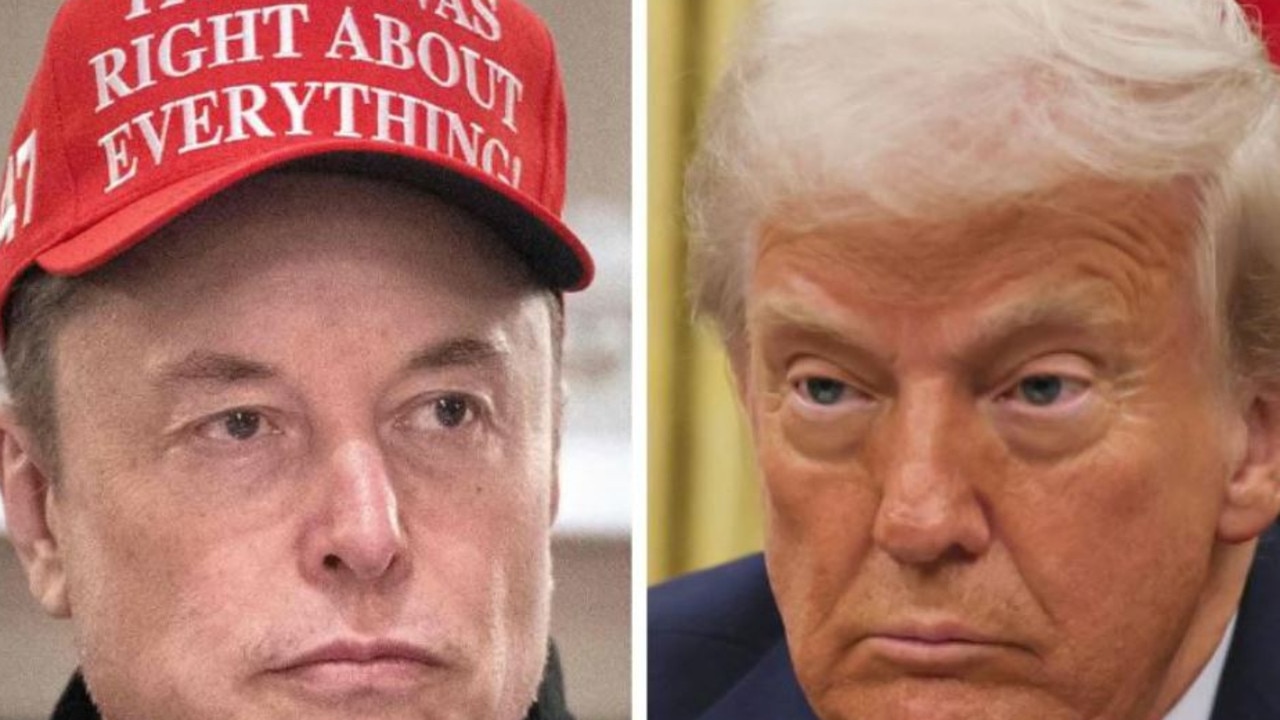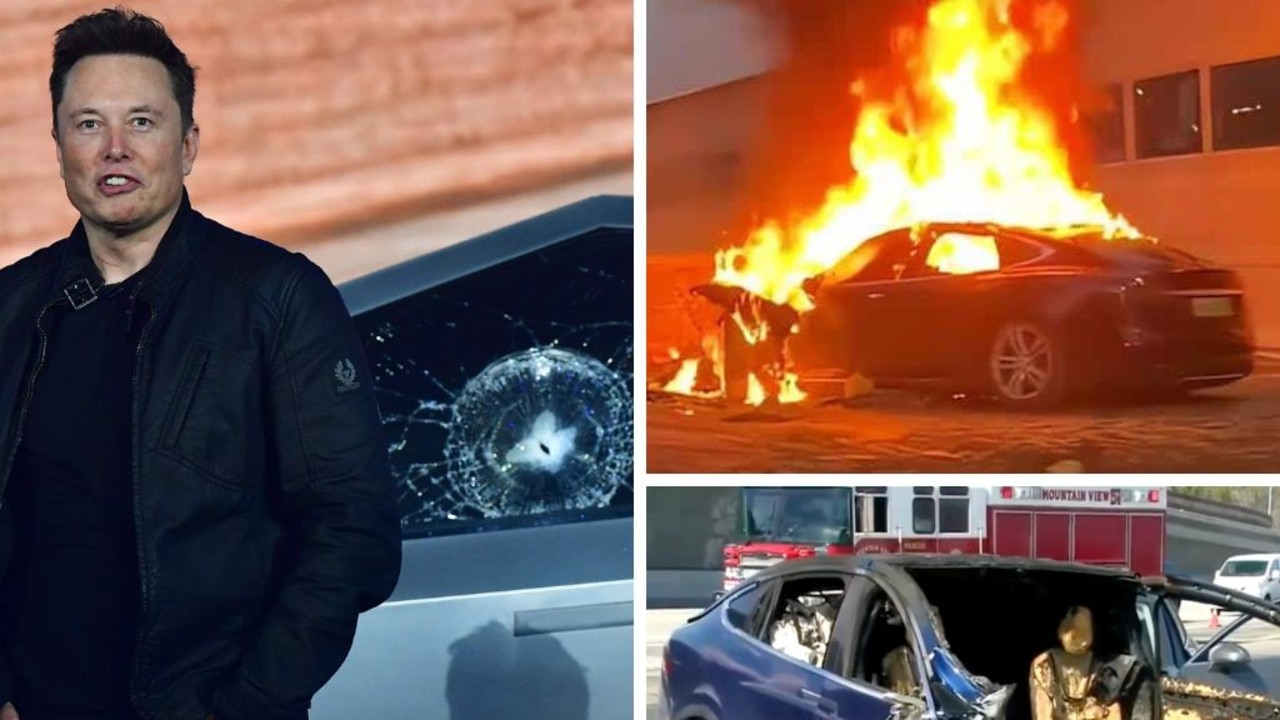Ukraine-Russia conflict: Putin ‘fires at least six generals’ as Belarus refits jets to carry nukes
Vladimir Putin’s chiefs are being blown up, poisoned and shot by Ukraine resistance forces as the Russian tyrant faces a “double whammy” from his inner circle and his enemies.
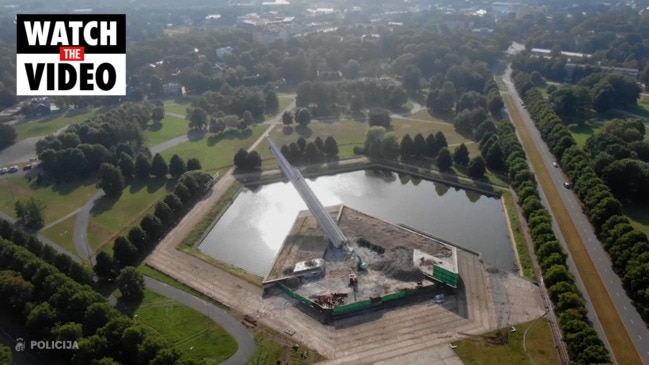
World
Don't miss out on the headlines from World. Followed categories will be added to My News.
Ukraine’s resistance movement has one message for Valdimir Putin and his stooges in Russian occupied parts of their country: You’re never safe even in your bed, according to The Sun.
Recent weeks have seen an upsurge in targeted assassinations of officials who have been shot, blown up and poisoned for working with the hated invaders.
Kherson, the first big city to fall to the Russians, has been a hotbed of resistance, and for a good reason.
Since Putin’s forces arrived, hundreds of local people have been detained and tortured, their dead bodies turning up weeks later.
So when a pro-Moscow official invited Russia to set up a military base there, posters soon appeared with a £15,000 ($A25,000) reward for his death.
Recent assassinations there include that of Putin stooge Vitaly Gura, an official in the Kherson region, who was shot dead in his office.
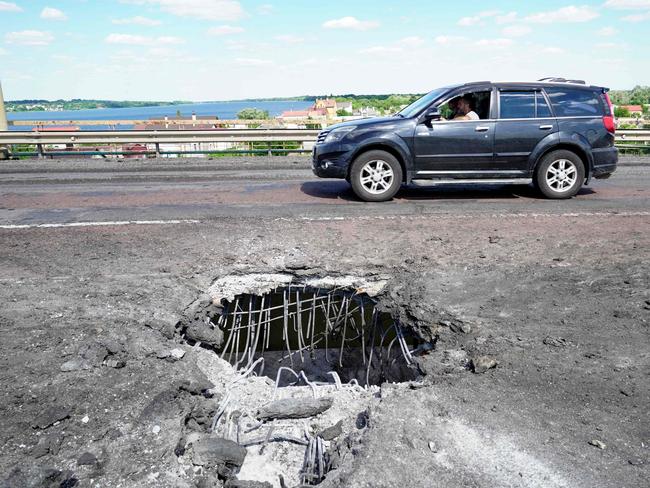
Dmitry Savluchenko, head of the families, youth, and sports department of the Kherson military-civilian administration, was killed in a bomb.
The explosion had burned two cars and shattered the windows of a nearby four-storey house.
Notorious pro-Russian blogger Kuleshov was also shot dead in Kherson.
Additionally, top pro-Putin official, Ivan Shushko, was killed in a car bomb in occupied Ukraine; and Putin collaborator Askyar Laishev, who worked for Ukraine’s secret service before swapping sides in 2014, was wiped out in a car bomb blast in Luhansk in July.
And The Sun reports that Ukrainian and Russian assassins are racing to take Mr Putin out before he escalates his unwinnable war.
Mr Putin faces a “double whammy” of threats from his inner circle who are believed to be secretly calling for his head, experts claim.
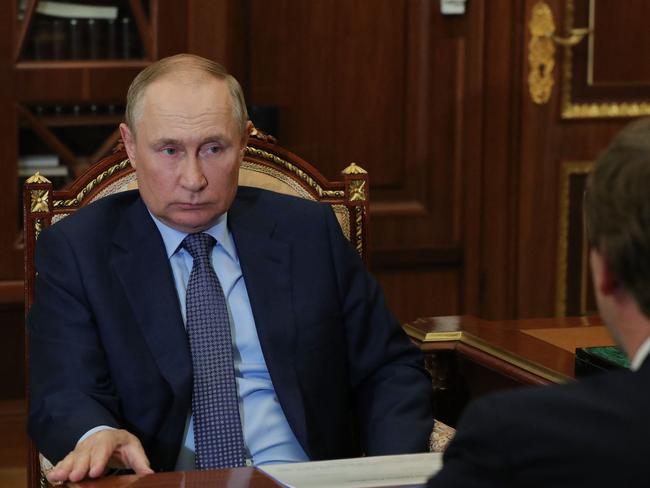
They accuse the Russian tyrant of being behind the grisly death of far-right journalist Darya Dugina in Moscow last week.
The Kremlin accused Kyiv of masterminding the attack on Russian soil and claimed they used a Ukrainian spy, her young daughter, and a Mini Cooper to carry it out - allegations its secret services have strongly denied.
Dugina criticised Mr Putin for being “too soft” on Ukraine and her death has being seen by many as the Russian leader’s attempt to quell critics.
Former NATO chief Gary Tabach, now based in Kyiv, said Ukrainian forces were “hunting down” Kremlin sympathisers in the occupied territories.
He told The Sun: “Guys who betrayed Ukraine; some of the deputies, some of the leaders of Ukraine who ended up in Russia right now voluntarily, will be for the rest of their lives hunted down.
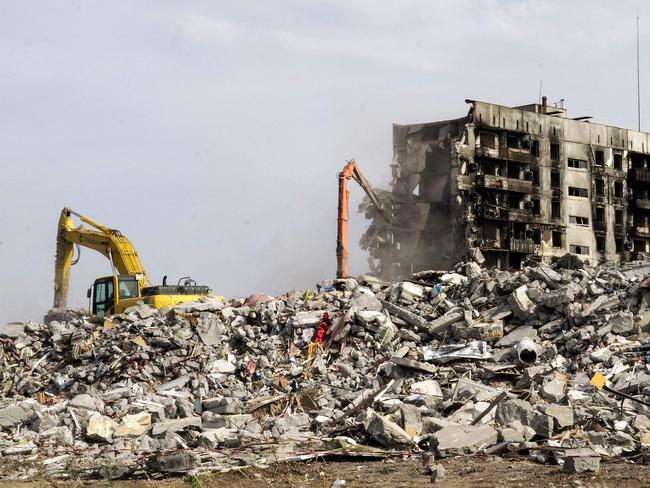
“Ukrainians have a very good imagination, they’re very innovative and are good at tracking them down.”
The US Navy veteran claimed Ukraine has a “priority list” of targets it wants to see dead, with Mr Putin in top spot.
“Putin has been on that list for a long time by many people,” he said.
“Ukrainian special ops will go for what will cause the most damage, the most effect on the population and set fear into people who corroborate with the Russians.
“They want collaborators to know that if they’re going to work for the enemy then they have to be prepared to die for it because we’re going to be hunting you down.”
PUTIN ‘FIRES AT LEAST SIX GENERALS’ AS BELARUS FITS JETS FOR NUKES
It comes as Russia is in the midst of a “deliberate misinformation” campaign as it attempts to cover the firing of at least six generals, according to the UK’s Ministry of Defence.
Russia’s stalled offensive comes as its closest ally, Belarus, refitted its SU-24 warplanes to carry nuclear armaments.
Belarusian President Alexander Lukashenko told reporters he had previously agreed to the move with Vladimir Putin.
While Belarus does not have its own nuclear weapons arsenal, the country has allowed its ally Russia to use its territory to launch Putin’s invasion of Ukraine.
While Moscow claims it’s deliberately slowing the pace of its offensive, the UK says the campaign has “stalled” amid strong resistance.
President Vladimir Putin and Defence Minister Sergei Shoigu have also “fired at least six generals”, the UK said.
Earlier this week, Shoigu told the Shanghai Cooperation Organisation that Russia was deliberately slowing the pace of its military campaign in Ukraine, driven by the need to reduce civilian casualties.
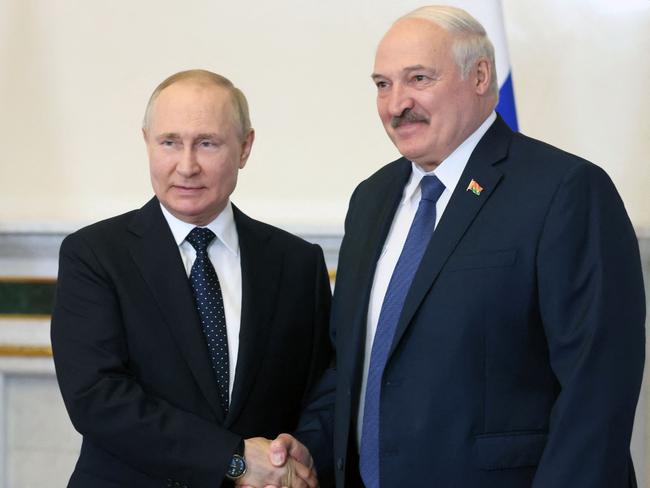
“This is almost certainly deliberate misinformation,” the UK Ministry of Defence said in an update.
“Russia’s offensive has stalled because of poor Russian military performance and fierce Ukrainian resistance. Under Shoigu’s orders, the forces operating in Ukraine have repeatedly missed planned operational timelines.”
“It is highly likely that Shoigu and President Putin have fired at least six generals for not advancing quickly enough.
“On the day Shoigu was speaking, a Russian SS-26 Iskander short-range ballistic missile struck a train in the town of Chaplyne, reportedly killing at least two children.
“This highlights Russia’s willingness to cause collateral damage when it perceives there is military advantage in launching missile or artillery strikes.”
SOVIET-ERA MONUMENT TOPPLED
A Soviet-era monument has been demolished in Latvia, closing “another painful page” of the country’s history.
The concrete obelisk topped by Soviet stars – the centrepiece of a monument commemorating the Red Army’s victory over Nazi Germany – was the latest in a series of Soviet monuments brought down after Russia’s invasion of Ukraine.
Onlookers cheered and applauded as the 80 metre structure was brought down, crashing into a nearby pond.
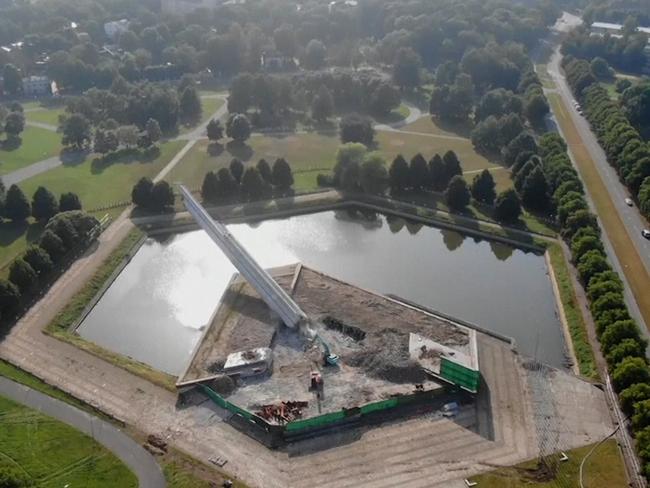
Built in 1985 when Latvia was still part of the Soviet Union, the obelisk was made up of five spires with three Soviet stars at the top, and stood between two groups of statues — a band of three Red Army soldiers on one side, and a woman representing the “Motherland” on the other.
Latvia regained independence in 1991 and eventually became a NATO and European Union member.
Via Twitter, Latvia’s foreign minister said by taking down the monument, Latvia was “closing another painful page of the history and looking for better future”.
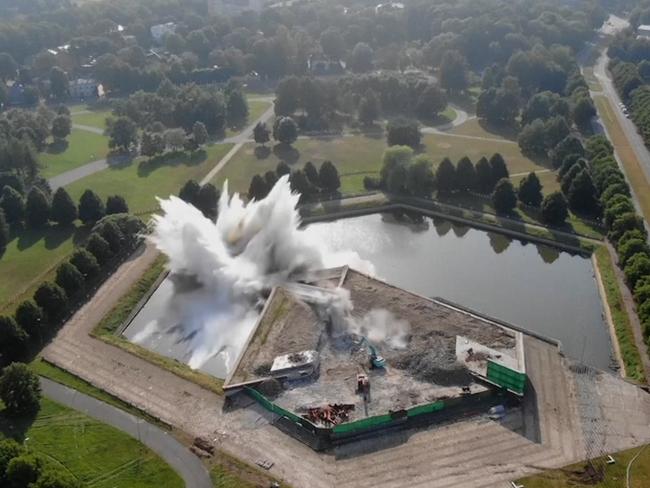
Latvia’s parliament voted to approve the demolition of the monument in May, along with the Riga City Council.
Since Russia’s invasion of the Ukraine in February, several eastern European countries have removed symbols from their communist eras.
Also once part of the Soviet sphere, the Polish government said a memorial site in neighbouring Belarus containing the graves of Polish soldiers who died during World War II was being levelled to the ground by the Belarusian authorities.
The news follows Poland’s announcement it would demolish a monument to Soviet Red Army soldiers in Poland, one of dozens that have been marked for destruction.
Last week Estonia removed a Soviet World War II monument from near a city on the Russian border.
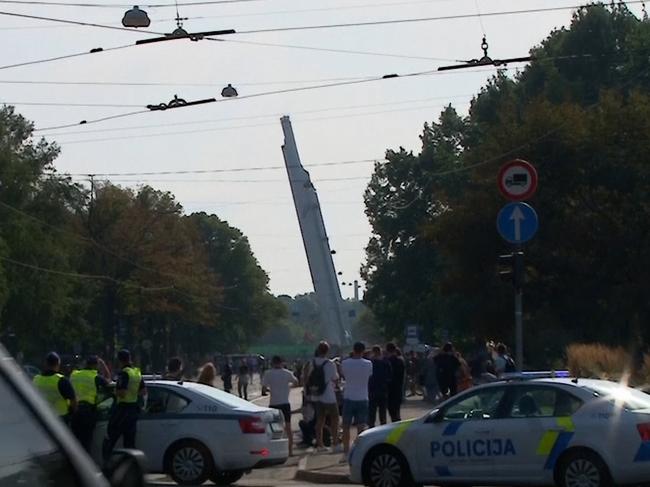
NUCLEAR PLANT CUT FROM GRID
Europe’s larges nuclear plant, under occupation by Moscow’s troops, was disconnected from Ukraine’s national power supply.
It came as Vladimir Putin ordered a massive troop surge of Russia’s military to swell its ranks to over two million.
The Zaporizhzhia plant has been occupied by Russian troops in southern Ukraine since the opening weeks of the war, and remained on the front lines ever since.
Recently Moscow and Kyiv have traded blame for shelling around the complex, a “highly volatile” development the International Atomic Energy Agency says “underlines the very real risk of a nuclear disaster”.
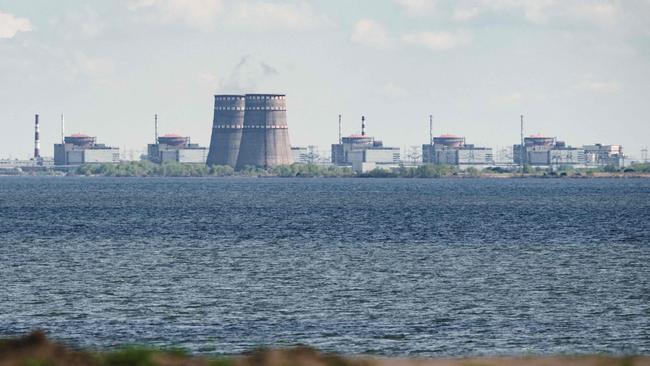
The development came on a day when Russian President signed a decree to increase the headcount of his country’s army to more than two million, including 1.15 million servicemen, from next January, according to the document published on a government portal.
Putin last set the army headcount in 2017 at around 1.9 million people with 1.01 million soldiers.
Ukraine state operator Energoatom said the Zaporizhzhia plant was severed from the national network after a power line was twice disconnected by ash pit fires in an adjacent thermal power plant.
The three other power lines “were earlier damaged during terrorist attacks” by Russian forces, the operator said.
“The actions of the invaders caused a complete disconnection of the (Zaporizhzhia Nuclear Power Plant) from the power grid - the first in the history of the plant,” Energoatom added on Telegram.
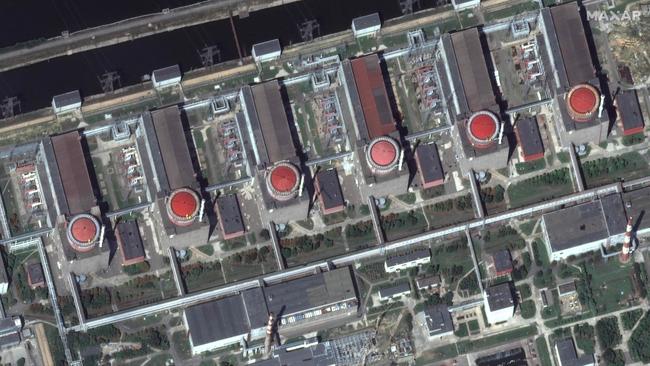
It added that “start-up operations are under way to connect one of the reactors to the network”.
Kyiv officials have said they believe Moscow has seized the station in order to divert power to the Crimean peninsula annexed by Russia in 2014.
Energoatom could not be immediately reached for comment on whether the supply had been diverted, the cause of the ash pit fires, or the number of those without electricity.
However, the mayor of the city of Melitopol Ivan Fedorov said “Russian occupiers cut off the electricity in almost all occupied settlements of Zaporizhzhia”.
Britain’s defence ministry said satellite imagery from the weekend “indicated that Russia maintained an enhanced military presence at the site”.
“The principal risks to reactor operations are likely to remain disruption to the reactors’ cooling systems, damage to its back-up power supply, or errors by workers operating under pressure,” the ministry added in a statement.
INDEPENDENCE DAY DEATHS
The death toll from an air strike on a train station in central Ukraine rose to 25, as the EU warned those “responsible for Russian rocket terror will be held accountable”.
Russia issued a counterclaim saying it targeted soldiers and killed 200 Ukrainian servicemen in the attack Wednesday on a rail hub in Chaplyne city of the Dnipropetrovsk region.
The attack struck six months to the day since Russia began its invasion of Ukraine and also on the day Ukraine celebrated its 1991 independence from the Soviet Union.
On Thursday, state rail operator Ukrainian Railways said the toll had risen overnight from 22 to 25, and included two children with a further 31 people injured.
Ukrainian President Volodymyr Zelensky had warned at the weekend Russia might do something “particularly cruel” to mark Ukraine’s independence celebrations.
In a daily press briefing, the defence ministry said the train was “en route to combat zones” in the eastern Donbas region of Ukraine, which Russia seeks to fully control.
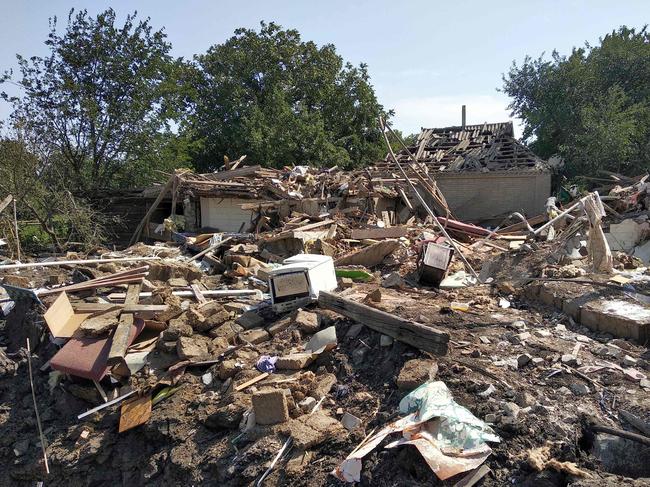
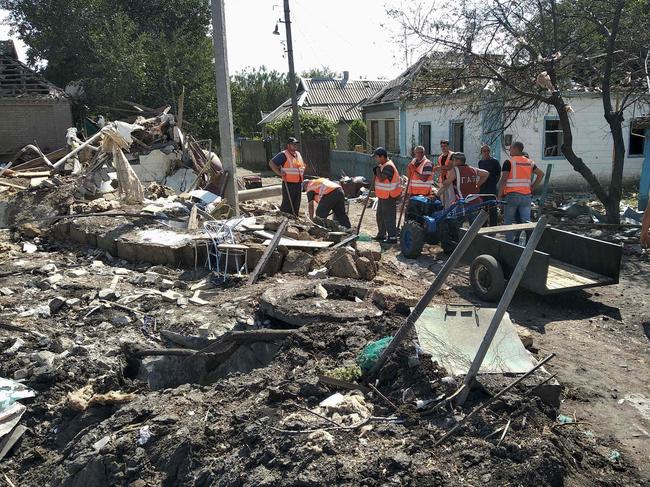
‘NO MERCY’ FOR DUGINA KILLERS
Russia’s Foreign Minister Sergei Lavrov vows “no mercy” for the killers of Daria Dugina, the daughter of an ultranationalist intellectual, as hundreds gather for her funeral following her death in a car bomb blast over the weekend.
Moscow says Ukrainian intelligence is behind the attack - a claim dismissed by Kyiv.
Alexander Dugin - a vocal supporter of the Kremlin’s military campaign who has claimed to be close to Russian President Vladimir Putin - may have been the intended target of the attack that killed his 29-year-old daughter.
“I believe that this is a barbaric crime for which there is no forgiveness,” Russia’s Foreign Minister Sergei Lavrov told journalists on Tuesday, calling for “no mercy” for those responsible.
Mourners - many carrying flowers - paid their respects at a hall in Moscow’s Ostankino TV centre where her black-and-white portrait was displayed over an open casket.
Dugin and his wife, both dressed in black, sat next to their daughter’s coffin. “She died for the people, for Russia, at the front. The front - it is here,” Dugin said at the ceremony.
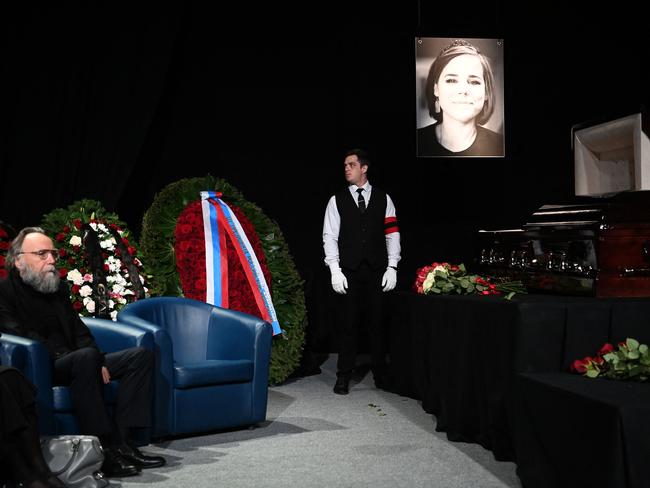
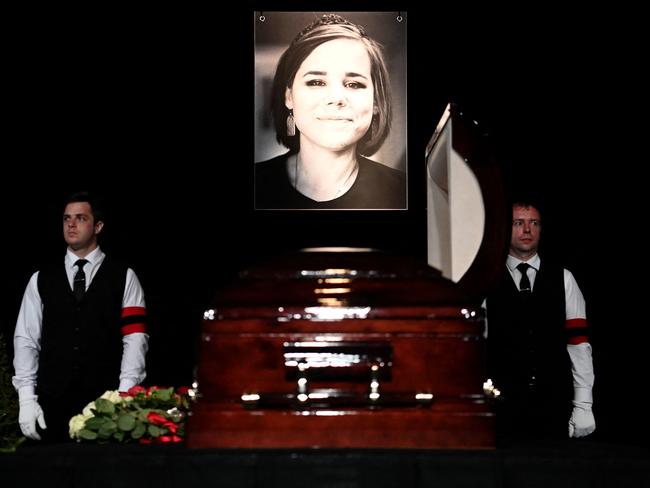
“Since childhood, among her first words - that we taught her of course - were Russia, our state, our people, our empire,” he added.
Dugina was killed Saturday when a bomb placed in her car went off as she drove on a highway outside Moscow.
Russia’s vow of revenge comes as the United States warns of an planned increase of strikes on civilian infrastructure and government buildings in Ukraine, as the nation prepares to mark its independence day.
Wednesday will mark the six-month anniversary of Russia’s invasion of Ukraine, as well as the nation’s 1991 break from the Soviet Union.
“The Department of State has information that Russia is stepping up efforts to launch strikes against Ukraine’s civilian infrastructure and government facilities in the coming days,” the US embassy in Kyiv says in a new security alert, urging its citizens to leave Ukraine if possible.
Ukrainian President Volodymyr Zelensky has already warned that “Russia could try to do something particularly disgusting, particularly cruel” in the coming days.
PUTIN REACTS TO ‘VILE CRIME’
Vladimir Putin has broken his silence over the killing of the daughter of his ally Russian “war brain” Alexander Dugin, calling the car bomb attack a “vile crime”.
Darya Dugina, 30, was killed after a car bomb exploded on the outskirts of Moscow.
It is thought that her father, a hard-line Russian ideologue and vocal supporter of the Kremlin’s offensive in Ukraine, was the likely target of the attack, which Russia’s security service says was the work of a Ukraine woman.
Ukrainian officials have denied any involvement in the explosion.
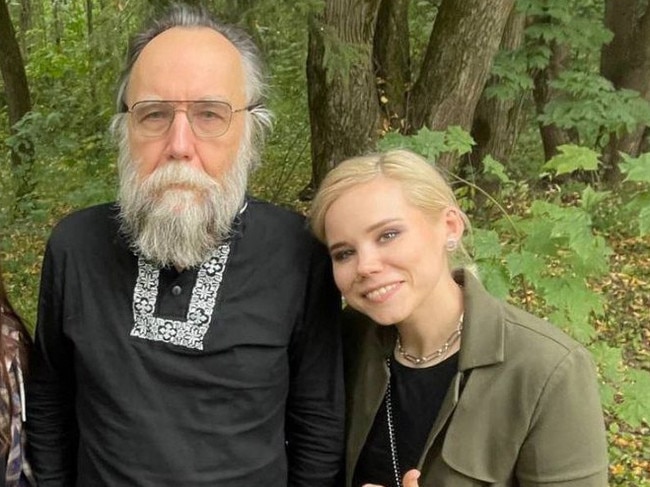
Mr Putin described Dugina as a “kind, loving” person, in a statement released by the Kremlin.
“A vile, cruel crime ended the life of Darya Dugina, a bright, talented person with a real Russian heart — kind, loving, sympathetic and open,” he said.
Ms Dugina was a journalist who openly supported the offensive.
It comes after reports Mr Dugin suffered a heart attack after dodging what is thought to have been an assassination attempt on his life.
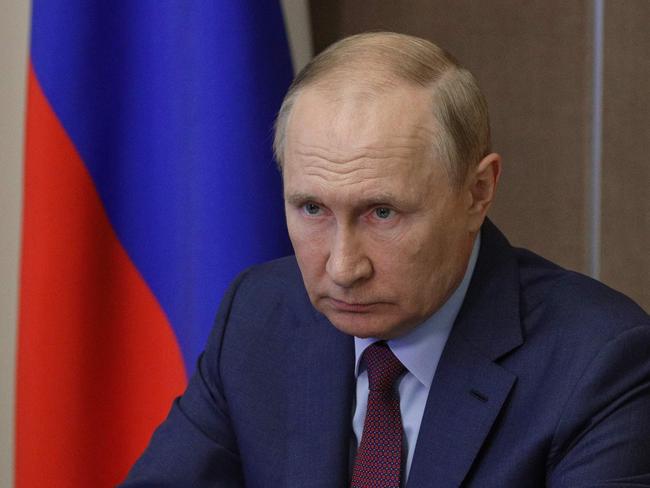
Mr Dugin, who has been referred to as “Putin’s Rasputin”, has since called the bombing a “terrorist attack carried out by the Nazi Ukrainian regime”, reports The Sun.
“But they will not succeed. Our hearts yearn for more than just revenge or retribution,” he said.
“It’s too petty, it’s not Russian style. We need only our victory. My daughter laid her life on its altar – so please win.”
There are unconfirmed reports Mr Putin may have ordered the hit himself.
It comes as Kyiv reports nearly 9000 Ukrainian soldiers have been killed since Moscow launched its invasion.
Ukraine President Volodymyr Zelenskyy has warned Russia might start a trial of Ukrainian soldiers captured during the Mariupol siege on Ukraine’s Independence Day.
ALEXANDER DUGIN’S DAUGHTER KILLED IN CAR BOMB
Russian security FSB services said Monday that a Ukraine woman was behind a car bombing in the outskirts of Moscow that killed the daughter of hard-line Russian ideologue Alexander Dugin.
Dugin – an outspoken ultranationalist intellectual and a vocal supporter of the Kremlin’s offensive in Ukraine – is thought to have been the likely target of the attack.
“The crime was prepared and committed by Ukrainian special services,” the FSB said in a statement carried by Russian news agencies.
It added that the perpetrator is Natalia Vovk – a female Ukrainian citizen born in 1979 – on Sunday fled to EU member Estonia.
Pro- and anti-Russian and Ukraine commentators took to social media to share video of the explosion and try to unmask the identity of the agent, the images of which are yet to be verified.
L'ukrainienne Natalia Vovk (Natalia Shaban-Vovk) est la première suspecte qui a déposé l'engin explosif dans la voiture de Daria Douguine. Elle est activement recherchée et a intérêt de savoir cavaler plus loin que l'Estonie !#NataliaVovk#Douguine#Dugin#russiepic.twitter.com/J8889wayD0
— Marcel D. (@DubreuilhMarcel) August 22, 2022
FSB: the murder of Daria Dugina was prepared and carried out by the Ukrainian special services.
— Shternkuker (@SIL_trader) August 22, 2022
The performer is a citizen of Ukraine Natalia Vovk, born in 1979, who arrived in Russia on July 23 and left for Estonia after committing the crime. pic.twitter.com/UCk40QMuLb
Daria Dugina was killed when a bomb placed in a Toyota Land Cruiser went off as she drove on a highway 40 kilometres outside Moscow.
Reports from Russian media suggested Dugina borrowed her father’s car at the last minute.
Dugin, 60, sometimes called “Putin’s Rasputin” or “Putin’s brain,” is an outspoken Russian ultranationalist intellectual. He was later pictured at the scene of the explosion and The Sun reported he has since suffered a suspected heart attack.
The FSB said the attacker was at a festival outside Moscow that Dugin and his daughter attended on Saturday.
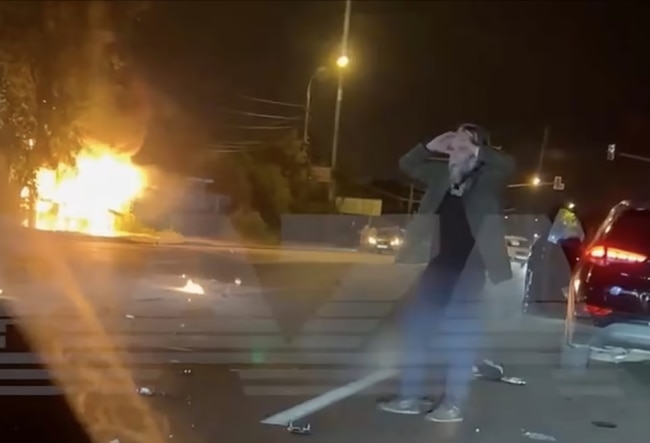
According to the statement, Vovk arrived in Russia in July 2022 with her underage daughter and rented an apartment in the same building where Dugina lived.
The Russian state has alleged the attacker followed Dugina in a Mini Cooper with registration plates issued in Kazakhstan, Ukraine and in the breakaway Donetsk People’s Republic in eastern Ukraine, the FSB added.
But a Ukrainian presidential adviser, Mykhaylo Podolyak, on Sunday denied that Kyiv authorities were behind the bombing
Dugina, a journalist born in 1992 who herself openly supported the offensive, died at the scene.
In July, Britain put her on a list of sanctioned Russians for allegedly spreading online disinformation about Ukraine.
Dugin, 60, sometimes called “Putin’s Rasputin” or “Putin’s brain,” is an outspoken Russian ultranationalist intellectual.
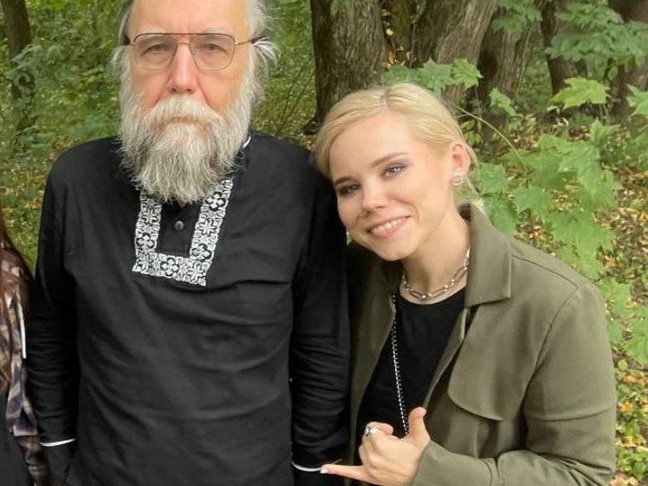
He has long advocated the unification of Russian-speaking territories in a vast new Russian Empire and wholeheartedly supported Moscow’s operation in Ukraine.
He was put on a Western sanctions list after Russia annexed Crimea in 2014, a move he also backed.
There was no immediate claim of responsibility for the bombing.
The head of one of Ukraine’s breakaway separatist regions blamed the blast on Kyiv authorities.
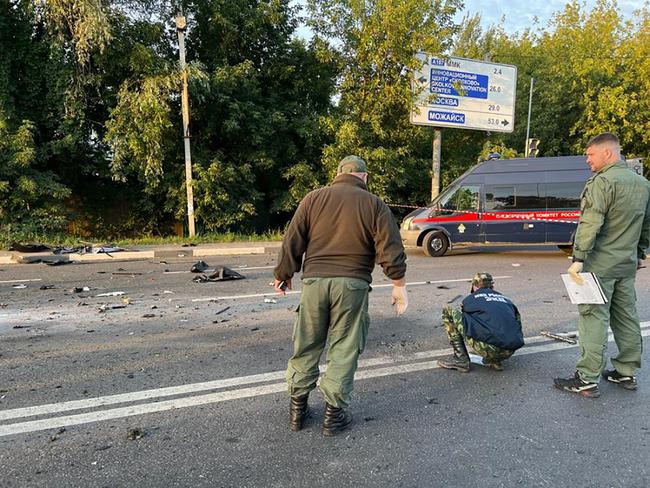
“The Ukrainian regime terrorists tried to liquidate Alexander Dugin, but blew up his daughter,” DNR chief Denis Pushilin wrote on Telegram.
A Ukrainian presidential adviser, Mykhailo Podolyak denied that Kyiv authorities were behind the bombing.
“Ukraine surely doesn’t have anything to do with yesterday’s explosion because we’re not a criminal state,” he said in televised remarks.
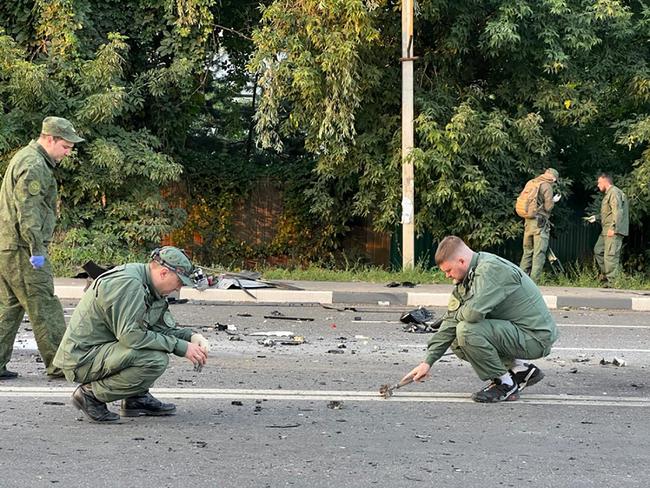
KIDS KILLED IN ATTACK ON UKRAINE
Twelve Ukrainians, including three children, were wounded after Russian forces attacked an apartment block and several houses in the city of Voznesensk, near a key nuclear plant, prosecutors said.
“According to preliminary information, 12 people including three children were injured. Two children are in a serious condition,” the prosecutor’s office said on Telegram.
Regional governor Vitaly Kim had earlier said on Telegram that nine people were injured, including four children aged between three and 17, and were “all in serious condition”.
Voznesensk is located about 20 kilometres from the nuclear plant at Pivdennoukrainsk, Ukraine’s second largest, and 70 kilometres from Mykolaiv, the regional capital.
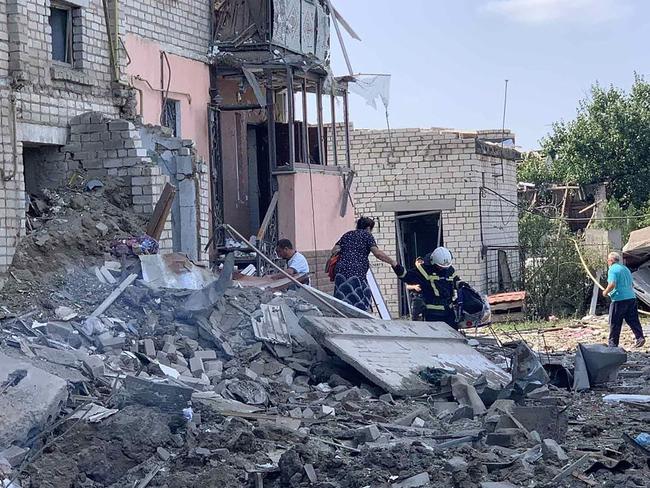
A Russian strike in the 30km zone around the plant “is another cynical act of nuclear terrorism by Russia”, Ukraine’s nuclear operator Energoatom wrote on Telegram.
“It cannot be ruled out that this missile was fired in the direction of the Pivdenukrynsk power station which the Russian military already tried to seize in early March.”
The strikes hit an apartment building and several homes in the city, which is home to 30,000 people, the emergency services said on Facebook, showing a badly damaged building.
The region, at the forefront of the war, suffers regular strikes.
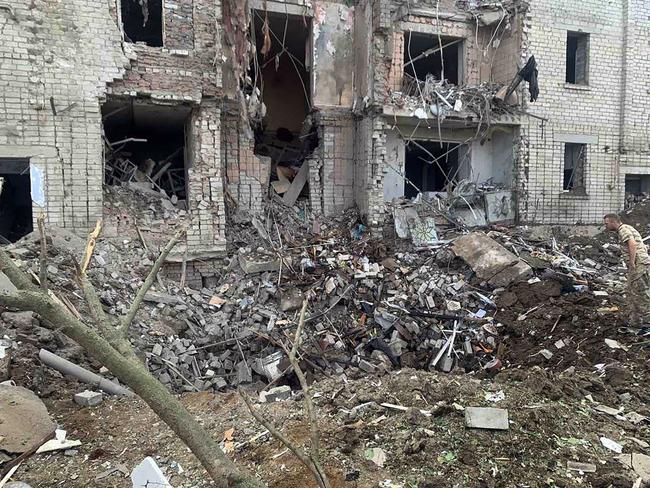
“The terrorist country called Russia hit a residential building,” presidential chief of staff Andriy Yermak said on Telegram.
The Ukrainian army meanwhile said they had downed four Kalibr high-precision sea-launched cruise missiles fired from the Black Sea near the central city of Dnipro.
Ivan Fedorov, the exiled mayor of Melitopol, a city in the Kherson region which has been occupied by Russia, said the Ukrainian army had bombed a Russian military base in the city.
The Ukrainian army meanwhile reported Russian attacks in the eastern Donetsk region – which has been partially controlled by Russian proxies since 2014 – saying “fighting is continuing”.
KREMLIN WARNS OF NUKE DANGER
Russia’s President Vladimir Putin in a call with French counterpart Emmanuel Macron on Friday, local time, accused Ukraine of attacking the Moscow-occupied Zaporizhzhia nuclear plant, and warned of a potential “catastrophe”, the Kremlin said.
Mr Putin “stressed that the systematic shelling by the Ukrainian military of the territory of the Zaporizhzhia nuclear power plant creates the danger of a large-scale catastrophe,” the Kremlin said in a statement, adding that both leaders called for an International Atomic Energy Agency (IAEA) inspection of the plant “as soon as possible”.
The Russian leader also called for independent inspections at the plant, saying a strike could “lead to radiation contamination of vast territories”.
“The Russian side confirmed its readiness to provide the Agency inspectors with the necessary assistance,” the statement said.
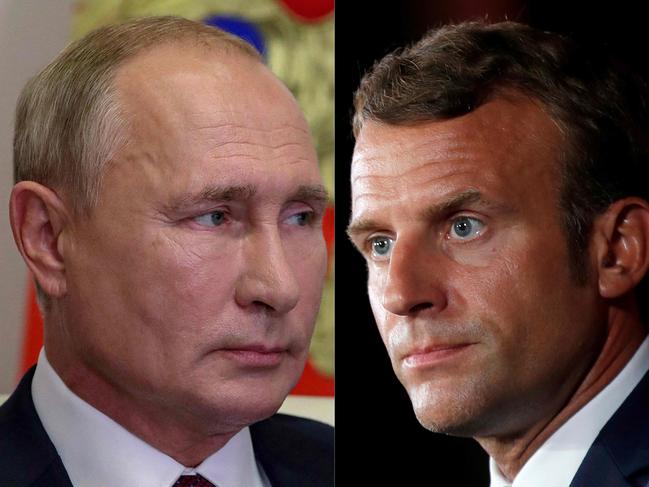
In a separate statement, the French presidency said that Mr Macron “supported the dispatch of a mission of experts from the IAEA to the site under conditions agreed by Ukraine and the United Nations”.
Mr Putin and Mr Macron will speak again “in the coming days on this subject after talks between the technical teams and before the deployment of the mission,” according to the Elysee.
The Zaporizhzhia nuclear power plant was seized by Russian troops in March and recent fighting around it has raised the spectre of a nuclear incident comparable to Chernobyl.
Both Kyiv and Moscow have this week accused each other of preparing “provocations” at the facility.
The plant – the biggest in Europe – was targeted by several strikes in recent days, increasing fears of a nuclear disaster. Both Kyiv and Moscow have traded blame over the attacks.
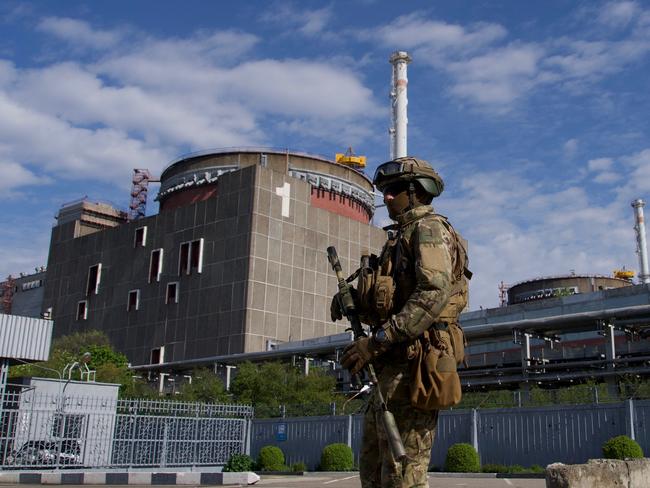
It comes as UN chief Antonio Guterres on Friday asked that the nuclear power station not be cut off from Ukraine’s grid, following Ukrainian reports that Moscow was planning to do so.
“Obviously the electricity from Zaporizhzhia is Ukrainian electricity … This principle must be fully respected,” the UN Secretary General said during a visit to the port of Odessa in southern Ukraine.
“There is information that Russian occupying troops are planning to shut off the reactors and switch them from the output lines of the Ukrainian energy system,” Ukrainian energy operator Energoatom said.
The operator also warned Russia was limiting staff access to the site. Last week Energoatom said Russian forces were planning to re-route Zaporizhzhia’s electricity to Crimea, annexed in 2014.
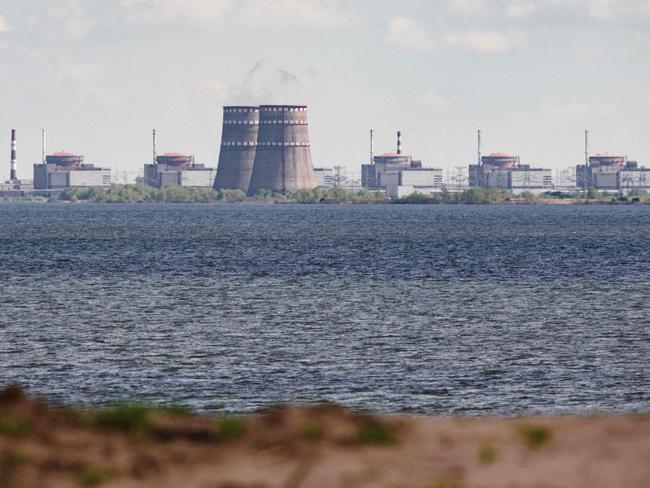
Both sides have this week accused the other of preparing “provocations” at the facility.
The plant – the biggest in Europe – was targeted by several strikes in recent days, increasing fears of a nuclear disaster. Both Kyiv and Moscow have accused each other over the attacks.
Guterres addressed those fears earlier this week in Lviv in western Ukraine saying that any damage to the plant would be akin to “suicide”.
The plant, located near the Russian-annexed Crimean peninsula, has six of Ukraine’s 15 reactors, and is capable of supplying power for four million homes.
UKRAINE FEARS ‘FALSE FLAG’ ATTACK AT PLANT
It comes as Europe's largest nuclear facility, following reports Russian nuclear authorities ordered power plant employees to stay home.
Reports of the order prompted Ukrainian authorities to warn of possible Russian provocations at Zaporizhzhia, the Ukraine facility taken over by Russian troops.
“There is new information, it arrived about half an hour ago, that for tomorrow, August 19, there is an order for the majority of the [power plant’s] staff not to go to work,” Andriy Yusov, a spokesman for Ukrainian military intelligence, told NBC News.
“This is what the Russians told their people, primarily the employees of [Russian nuclear agency] Rosatom.”
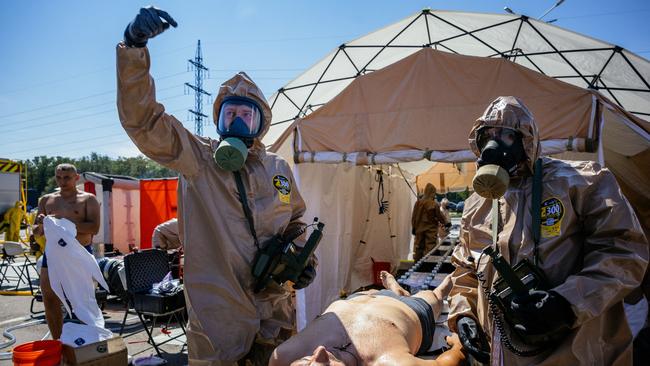
The New York Post reported Russia and Ukraine had been trading blame for recent shelling at the plant, which Russian forces seized in March and began using as a military base.
Two weeks ago, explosions took out a nearby electrical transformer, prompting one of the plant’s six nuclear reactors to shut down. Neither side claimed responsibility for the explosion.
The United Nations’ atomic energy chief, Rafael Grossi, urged both sides to allow experts access to the plant to assess its safety, however that’s yet to take place.
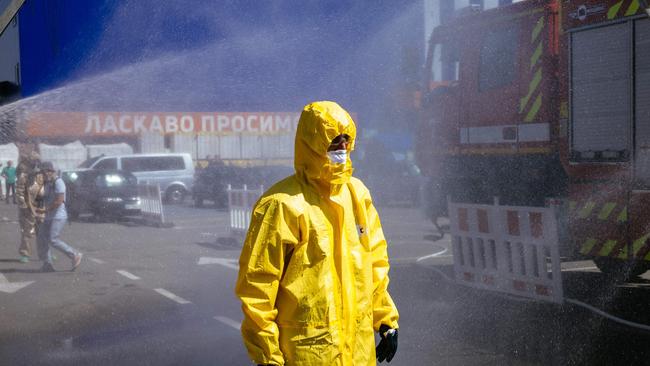
Russia’s UN ambassador, Vassily Nebenzia, blamed Ukraine for “pushing the world to the brink of nuclear catastrophe” with what he called the nation’s “criminal attacks on nuclear infrastructure”, reports The New York Post.
Mr Yusov, accused the Russians of planning “large-scale provocations”.
“We do not rule out the possibility of massive Russian provocations on the territory of the ZNPP tomorrow,” he said.
“This is confirmed by their propaganda, information from our sources, and the behaviour of the Russians at the station.”
Meanwhile Turkish leader Recep Tayyip Erdogan warned Thursday of a nuclear disaster in Ukraine during his first face-to-face talks with President Volodymyr Zelenskyy since Russia’s invasion began, echoing pleas from the UN’s chief.
A flare up in fighting around Europe’s largest nuclear facility in Russian-controlled southern Ukraine has sparked urgent warnings from world leaders and UN chief Antonio Guterres cautioned during talks with Mr Erdogan that any damage to the plant would be akin to “suicide”.
“We are worried. We don’t want another Chernobyl,” Erdogan said during a press conference in the eastern city of Lviv, during which he also assured the Ukrainian leader that Ankara was a firm ally.
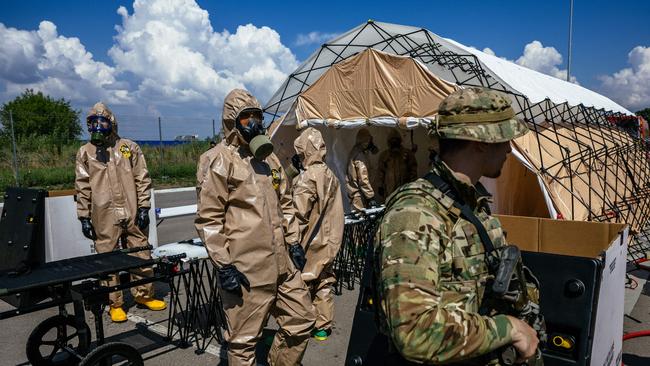
“While continuing our efforts to find a solution, we remain on the side of our Ukraine friends,” Mr Erdogan said.
Mr Guterres said he was “gravely concerned” about the situation at the plant and said it had to be demilitarised, adding: “We must tell it like it is – any potential damage to Zaporizhzhia is suicide”.
Mr Erdogan, who has major geopolitical rivalries with the Kremlin but maintains a close working relationship with Mr Putin, met with the Russian leader less than two weeks ago in the Black Sea resort of Sochi.
The Turkish leader along with Guterres were key brokers of a deal inked in Istanbul last month allowing the resumption of grain exports from Ukraine after Russia’s invasion blocked essential global supplies.
Ahead of the press conference with Mr Zelenskyy, Ukraine’s port authority announced that the 25th cargo ship under the deal had departed for Egypt carrying 33,000 tonnes of grain.
Ukraine and Russia are two of the world’s biggest grain exporters and the halt in exports saw grain prices soar and fears rise of global food shortages, particularly in poor countries already experiencing shortfalls.
Mr Guterres said during the meeting with reporters that the sides hoped to intensify efforts to bolster operations at three southern ports designated for exports under the deal.
“We will do our best to scale up our operations to face … the coming winter,” the UN chief said, hailing the deal that saw a safe corridor established for cargo ships to exit Black Sea ports.
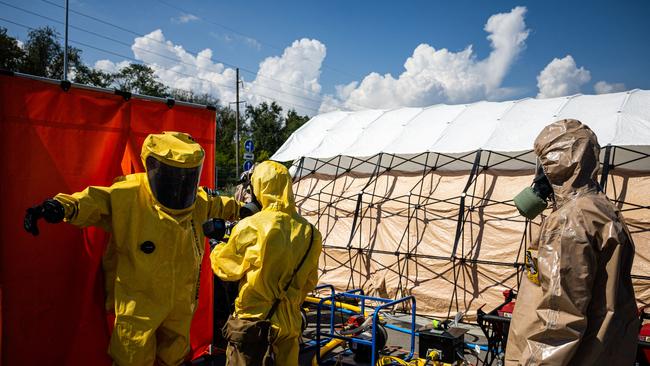
The success of the grain deal contrasts with failed peace talks early in the war and Mr Zelenskyy on Thursday ruled out peace with Russia unless it withdraws its troops from Ukraine.
He told reporters he was “very surprised” to hear from Mr Erdogan that Russia was “ready for some kind of peace”, adding: “First they should leave our territory and then we’ll see”.
Fighting raged along the front on Thursday.
In the war-scarred eastern region of Kharkiv, Russian strikes left several dead and dozens injured.
The early morning bombardments across the city of Kharkiv and nearby Krasnograd left at least six dead and 25 injured, just one day after Russian bombardments killed 13 in the country’s second-largest urban centre.
The regional governor Oleg Synegubov posted images from the scene of one Kharkiv strike showing the smouldering remains of several burnt-out buildings and twisted wreckage of destroyed vehicles nearby.
“Kharkiv. 175 days of horror. Daily terror, missile strikes on residential areas and civilians,” a senior presidential aide, Mykhailo Podolyak, wrote on social media.
– with AFP
More Coverage
Originally published as Ukraine-Russia conflict: Putin ‘fires at least six generals’ as Belarus refits jets to carry nukes



